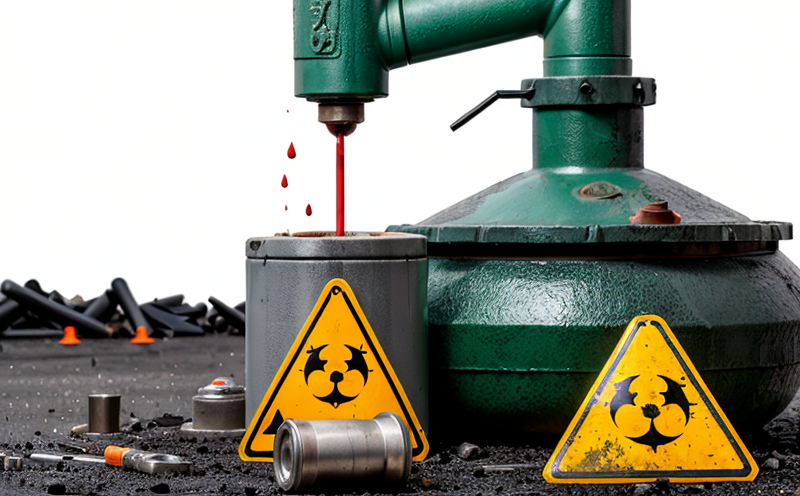Diesel Fuel Hazardous Residue Testing
Diesel fuel is a vital component in many industrial and commercial applications. However, it can contain hazardous residues that pose risks to human health and the environment. Diesel Fuel Hazardous Residue Testing ensures compliance with international standards and regulations aimed at minimizing these risks.
The testing process involves several critical steps to identify and quantify harmful substances in diesel fuel, such as polycyclic aromatic hydrocarbons (PAHs), nitroaromatic compounds, and other toxicants. These residues can originate from the production process or may be introduced during storage and distribution due to contamination.
Our testing method adheres to international standards such as ISO 8217 and ASTM D975, ensuring accuracy and reliability. The first step in the testing process is the collection of a representative sample of diesel fuel. This requires precise sampling techniques to ensure that the sample accurately reflects the characteristics of the entire batch.
The collected sample undergoes rigorous preprocessing to remove any contaminants or impurities. Following this, it undergoes quantitative analysis using advanced chromatographic techniques such as gas chromatography-mass spectrometry (GC-MS) and high-performance liquid chromatography (HPLC). These methods allow for the detection of even trace amounts of hazardous substances.
Once identified, the levels of hazardous residues are compared against predefined thresholds established by regulatory bodies. If these levels exceed acceptable limits, corrective actions must be taken to address the contamination source and ensure future batches meet safety standards.
In addition to identifying harmful residues, our testing also assesses the overall quality of diesel fuel. This includes checking for indicators such as water content, sulfur concentration, and cetane number. These parameters are crucial in determining the fuel's performance and usability across various applications.
Our laboratory employs experienced professionals who understand the nuances of diesel fuel analysis. They work closely with clients to ensure that all testing processes meet their specific requirements. We offer detailed reports outlining test results, along with recommendations for necessary adjustments or improvements.
The importance of this service cannot be overstated in today’s world where environmental concerns are paramount. By providing accurate and reliable diesel fuel hazardous residue tests, we contribute significantly to maintaining safety standards both within industries and public transportation sectors.
Benefits
The benefits of Diesel Fuel Hazardous Residue Testing extend beyond mere compliance; they encompass improved operational efficiency, enhanced reputation, and better environmental stewardship. Here are some key advantages:
- Regulatory Compliance: Ensures that your diesel fuel meets all relevant international standards like ISO 8217.
- Enhanced Safety: Identifies and mitigates potential risks associated with harmful residues in diesel fuel.
- Improved Reputation: Demonstrates a commitment to quality and safety, which can enhance your company’s image.
- Potential Cost Savings: By detecting issues early, you avoid costly repairs and replacements down the line.
- Better Environmental Impact: Reduces emissions from contaminated fuels, contributing positively to sustainability goals.
Eurolab Advantages
At Eurolab, we pride ourselves on offering comprehensive and precise diesel fuel hazardous residue testing services. Here’s why choosing us makes sense:
- Accurate & Reliable Results: Leveraging state-of-the-art analytical techniques ensures precision.
- Expert Team: Our team comprises highly skilled chemists and analysts with extensive experience in fuel testing.
- Comprehensive Reports: Detailed reports provide insights into not only hazardous residues but also overall fuel quality.
- Rapid Turnaround Times: Efficient processes mean quicker results, enabling faster decision-making.
- Custom Solutions: Tailored services meet the unique needs of different sectors and clients.
Environmental and Sustainability Contributions
Diesel fuel hazardous residue testing plays a crucial role in promoting environmental sustainability. By ensuring that diesel fuel complies with stringent standards, we help reduce the risk of harmful emissions and pollutants entering the environment.
Our testing contributes to cleaner air by identifying and eliminating sources of contamination before they can cause significant harm. This aligns with broader efforts towards reducing carbon footprints across industries. Furthermore, our services support initiatives aimed at improving fuel efficiency and reducing waste generation associated with non-compliant products.
Incorporating these practices into daily operations not only benefits the environment but also supports long-term business sustainability goals. As global regulations become more stringent regarding environmental standards, companies that adopt proactive measures like ours gain a competitive edge in fulfilling these requirements efficiently and effectively.





